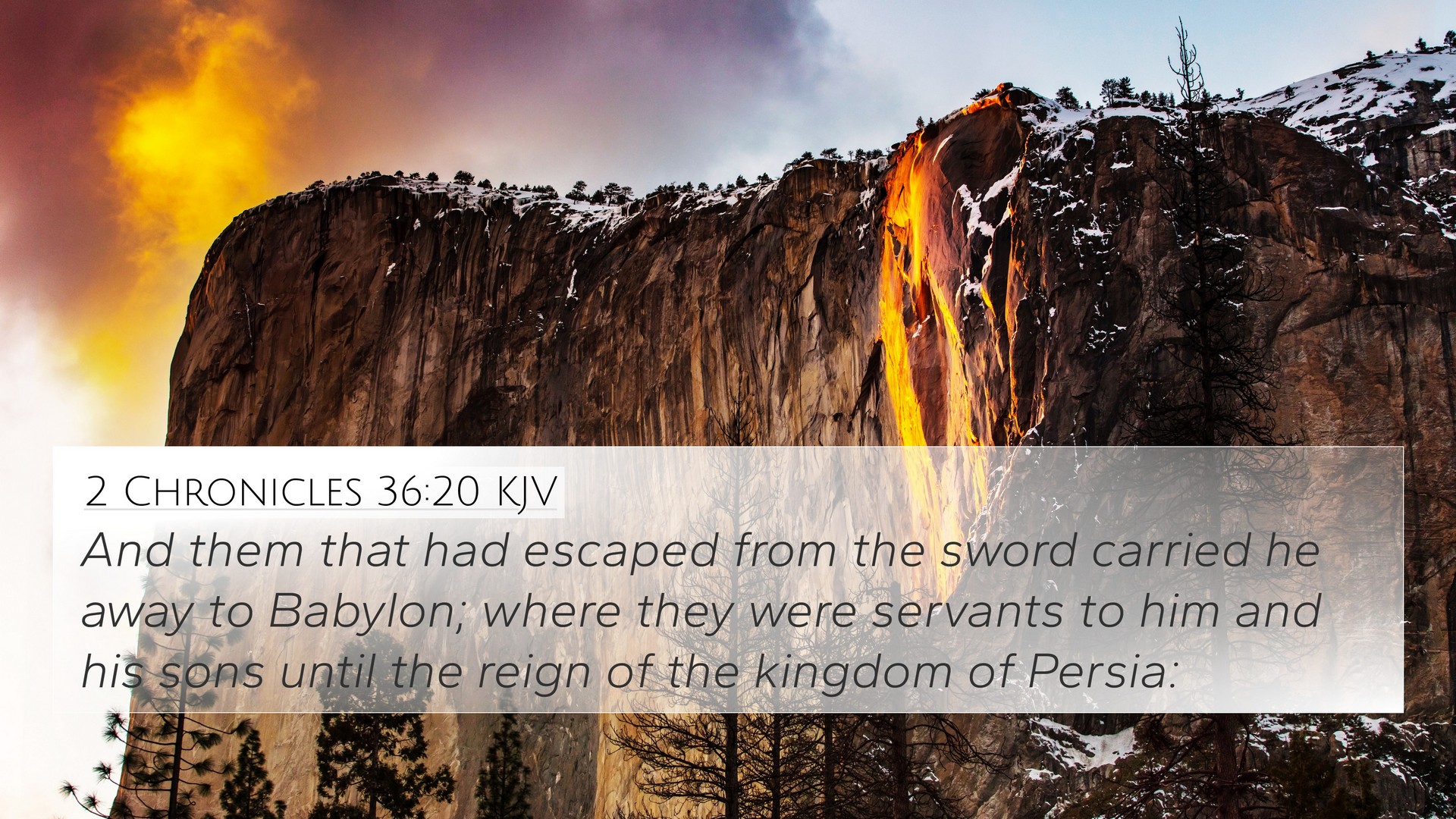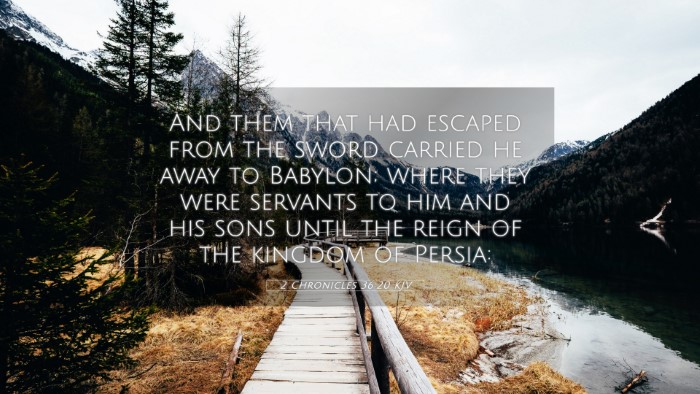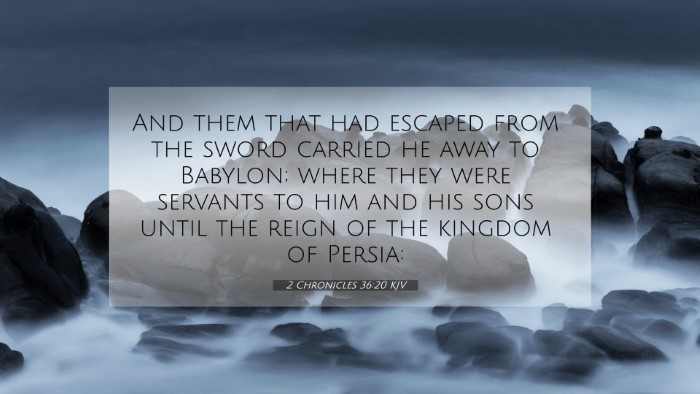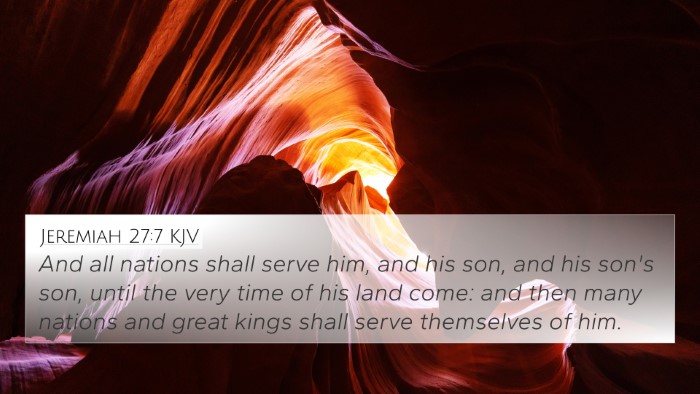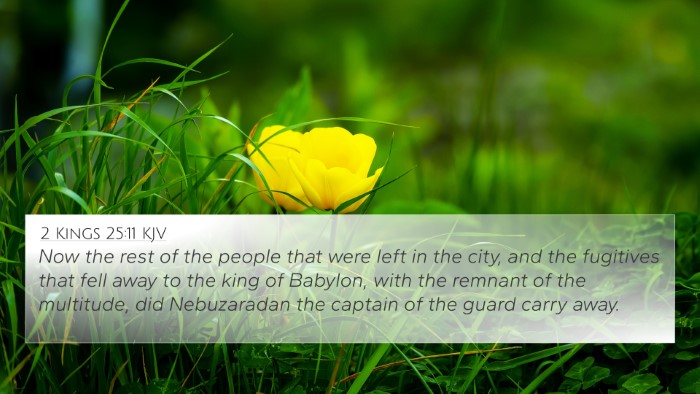Understanding 2 Chronicles 36:20
2 Chronicles 36:20 states: "And them that had escaped from the sword carried he away to Babylon; where they were servants to him and his sons until the reign of the kingdom of Persia:" This verse concludes the narrative of Judah's downfall and indicates the beginning of the Babylonian captivity, a significant event in Biblical history. Below is a comprehensive analysis drawing from various public domain commentaries.
Summarized Meaning of 2 Chronicles 36:20
The verse highlights a pivotal moment for the Israelites as many were taken captive to Babylon, marking both a physical and spiritual exile. The captivity is seen not only as punishment for Israel's persistent unfaithfulness but also as a critical turning point that would eventually lead to their restoration.
Commentary Insights
-
Matthew Henry's Commentary:
Henry emphasizes the divine judgment and the ultimate consequences of rebellion against God. The captives’ servitude in Babylon is portrayed not only as a period of punishment but also as an opportunity for reflection and growth. Henry notes that the kings of Babylon served as instruments of God’s will, and this time in captivity would prepare the Israelites for their eventual return and restoration.
-
Albert Barnes' Notes:
Barnes clarifies that the captivity served as a demonstration of God's sovereignty over nations. He provides insight into the significance of the term "escapes" indicating a remnant survived the siege, previously highlighting how this remnant is essential for the future restoration of Israel. Barnes points out that the period of servitude emphasizes the consequences of political and spiritual disobedience.
-
Adam Clarke's Commentary:
Clarke delves deeper into the socio-political implications of the Babylonian captivity, indicating how it shaped Israel's identity. He suggests that although the captivity appeared as a complete defeat, it laid the groundwork for the revival of faith and practice among the Jewish people. The mention of service to the king of Babylon underlines the harsh realities of exiled life, but also foreshadows their eventual liberation.
Bible Verse Cross-References
To gain a broader understanding of 2 Chronicles 36:20, it’s useful to explore its connections with related Bible passages. The following verses provide deeper insight into the themes of judgment, captivity, and restoration:
- Jeremiah 52:28-30 - Details further the exiles taken to Babylon and their subsequent return.
- Ezekiel 1:1-3 - Sets the context of the Babylonian captivity and the prophetic call during this period.
- Isaiah 39:6-7 - Prophecies foretelling the captivity due to unfaithfulness.
- 2 Kings 24:14-16 - Describes the physical exile of Judah's king and people to Babylon.
- Psalm 137:1-4 - The lament of the exiled Israelites who remember Zion in their captivity.
- Daniel 1:1-3 - Introduction to the lives of young Israelites taken to serve in Babylon's court.
- Nehemiah 1:2-3 - Nehemiah's awareness of the remnant left in Jerusalem after captivity.
- Micah 4:10 - A prophecy regarding the future deliverance from Babylon and restoration.
- Zechariah 1:12-16 - God's promise to return to Jerusalem and restore His people.
- Revelation 18:2 - Symbolic representation of the fall of Babylon, illustrating God's ultimate judgment.
Comparative Analysis of Related Themes
The themes presented in 2 Chronicles 36:20 can be explored through a comparative study of other scriptures that discuss God's judgment, the nature of captivity, and the promise of restoration. Understanding how these themes interconnect across both the Old and New Testaments enriches the reader's grasp of God's unfolding redemptive plan.
Bible Verse Parallels
Establishing connections between verses such as Isaiah 40:1-2, which offers comfort to the exiles, and Romans 8:28, which affirms God's plan for good even in suffering, helps to illuminate the consistent message of hope throughout Scripture. This inter-Biblical dialogue underscores the significance of context in understanding God’s ways with His people.
Tools for Bible Cross-Referencing
To engage in a deeper study of 2 Chronicles 36:20 and its thematic connections, utilizing tools such as a Bible concordance or a Bible cross-reference guide can facilitate a more comprehensive exploration. These tools help to identify parallels and cross-references, enhancing personal study or sermon preparation.
How to Use Bible Cross-References Effectively
Identifying connections between Bible verses enhances understanding and provides a fuller picture of God’s message. By employing a systematic Bible cross-reference system, one can easily trace themes and narratives across the Scriptures. Here are some practical steps:
- Start with a verse of interest and look for notation of related verses.
- Utilize a Bible chain reference approach to link verses thematically.
- Explore commentaries and study Bibles that provide cross-references alongside the text.
- Engage in comparative studies to analyze different interpretations and contexts.
Conclusion
2 Chronicles 36:20 serves as a profound reminder of the weight of disobedience and the hope of restoration. By exploring this verse through cross-references and comparative analysis, one can appreciate the depths of God's character and His promises toward His people. Understanding these interconnections aids in grasping the overarching narrative of redemption throughout the Bible.
